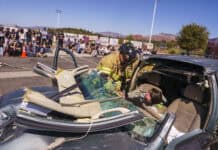It’s still too soon to know the long-term economic effects that the COVID-19 pandemic will have on cities, states and the country.
However, a recent business survey conducted by Northern Arizona University gives some insight as to the impact thus far among the larger communities in Coconino County including Sedona, Flagstaff, Page and Williams. Even though only a portion of Sedona sits within Coconino County — with the rest in Yavapai County — the survey was open to all Sedona businesses.
The survey ended April 21 with the report distributed last week.
“I’m grateful to NAU for conducting this survey,” Sedona Economic Development Director Molly Spangler said. “Short of anecdotal information and conversations, this type of information is difficult to acquire at the local level. This will likely be the first of a few surveys to be conducted, and this first one gives us a good starting point from which to continue to understand and track the impacts of COVID-19 and our recovery.”
Spangler said the survey brings to light what she has been hearing through residents: That businesses are losing significant revenue, many are laying off and/or furloughing employees and that access to federal assistance has often been difficult.
“Additionally, this survey further validates that those in the hospitality and retail industries are most negatively impacted,” Spangler said.
Of the 124 Sedona businesses that took part in the survey, 24% were from the retail sector followed by miscellaneous and tourism/attractions at 11% each and lodging, which made up 10% of the respondents, medical and construction at 7% and six other categories each at 6% or less.
Spangler said based upon everything she’s been hearing, nothing from the survey surprised her. It shows that those businesses that have remained open have seen a 47% loss of revenue, while 57% of all the businesses that responded have had to furlough or lay off employees. And, of those surveyed, 60% said they had applied for federal aid.
By comparison, 174 Flagstaff businesses took part in the survey. Of those, 64% have remained open, 45% have seen furloughs or layoffs and 54% applied for federal aid.
“This was the first comprehensive survey to understand impacts of COVID-19,” Spangler said. “We had a good Sedona response rate and that makes me believe that this is a good representation of our business sector.”
Of those that responded, nearly half of Sedona businesses have remained opened in some way during the pandemic. That may surprise some who are seeing empty parking lots and barren streets throughout town. But as Spangler pointed out, many of these businesses include professional services, health care providers and commercial real estate.
“We also have a lot of home-based businesses as well,” she said. “Many of those businesses are still operating. While they may not be operating at 100%, they didn’t have to shut their doors like a retail shop in Uptown may have had to.”






















